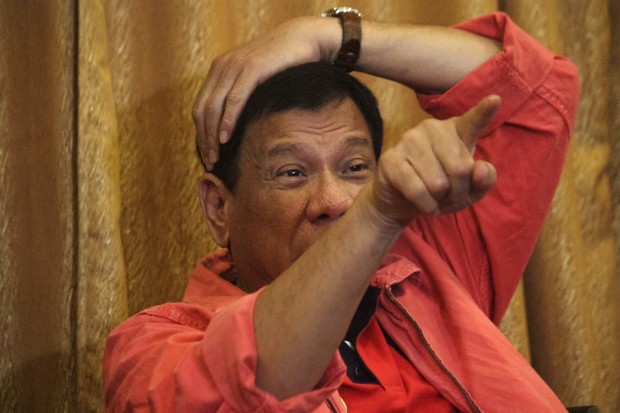
Incoming President Rodrigo Duterte calls for a press conference on Wednesday evening until Thursday dawn and vows to hit hard against police officials involved in the illegal drug trade following an incident in a concert in Pasay City that left 5 people dead. KARLOS MANLUPIG/INQUIRER MINDANAO
DAVAO CITY—Presumptive President-elect Rodrigo Duterte warned at least four major law enforcement agencies that they face a “massive revamp” once he’s in power, as he expressed anger over the deaths of five concertgoers in Pasay City last week and called the tragedy a “failure of intelligence” in the war on illegal drugs.
Facing the press with his trademark tough-talk and cursing, the Davao City mayor cited the National Bureau of Investigation, the Philippine National Police, the Philippine Drug Enforcement Agency (PDEA) and the Bureau of Corrections (BuCor) as the targets of the top-to-bottom shakeup.
The reshuffle will “include generals,” he said in the media briefing he called around midnight on Wednesday. “There will be massive movements of people in government. The NBI and the police. The Army, so far, [it’s] doing good, I’m satisfied.”
Missing in action
“Where was the NBI? Where were the police? Where was the PDEA? Why was the death toll so high?” he said in exasperation, alluding to the agencies’ supposed inaction or lack of preemptive measures in connection with the CloseUp Forever Summer outdoor concert held May 21 at a Pasay City mall.
Five concertgoers aged 18 to 36 collapsed at different areas of the venue and died hours later in the hospital. As the PNP and the NBI await test results to pinpoint the cause of the deaths, social media has since been abuzz with accounts that they were induced by party drugs.
Duterte said the victims may have succumbed to “a deadly mix [of drugs] intended to kill people,” a cocktail of uppers and downers. “Their brains swelled, not knowing how to respond to the chemicals.”
“It’s unacceptable,” he told reporters. “It’s a failure of intelligence. They (law enforcers) know that it’s a concert, and when there are bands like that—well, not all—but in concerts, there is distribution of drugs. May mga g*** talaga (There are people who are really stupid).
‘Where are your funds?’
“Law enforcement has failed. God willing, if I make it to June 30th noontime (the day the new president is sworn into office), I will sit down with everyone and ask: Where were your funds for intelligence and operations?”
He said the police should have sniffed around for illegal activity at the concert venue at the start of the event. “You police officers, sons of b****, you go ahead and die,” he said. “Why should we pay you [with taxpayers money] when you’re not doing your job? This time, every government worker must prove to the people that they deserve the salary.”
He called slackers in the police force and those known to have links to the drug trade to resign and give way to new blood, noting that “we are producing so many criminology graduates every year.”
‘Freeloaders’
“Maybe you want to retire; perhaps bigger retirement benefits await you. You’re freeloaders, the government feeds you, fattens you up, and on the side you do ‘shabu’?” he added.
Duterte also had a warning for guards at New Bilibid Prison in Muntinlupa City, where it had been reported that convicted drug lords continue to call the shots and operate syndicates behind bars despite repeated crackdowns.
“Those who are assigned in [Bilibid], pack your bags. I will send you to Iwahig (Prison and Penal Farm). Maybe I will ask the Army [to take over] for a while and guard the prisoners. I will think about where to put you (Bilibid guards) first.”
In reaction to Duterte’s pronouncements, the PNP spokesperson said it is within the authority of the incoming president to reassign policemen.
It’s his prerogative
“He has all the power to do that. It is within his authority, discretion and prerogative to assign any personnel in any area where he deems it necessary,” Chief Supt. Wilben Mayor said.
The PNP, he said, has internal policies for assigning policemen to their areas of residence if possible so they could use their local knowledge of the community in fighting crime. “That’s just internal to the PNP, but being the president, he (Duterte) has the power to reassign policemen.”
The incoming president also has the right to probe how the PNP had used its intelligence and operations funds. “The unit commanders can be asked to explain what [the money] was used for and why the situation [in their area] is still like that despite the support given to them. With a report from Julie M. Aurelio